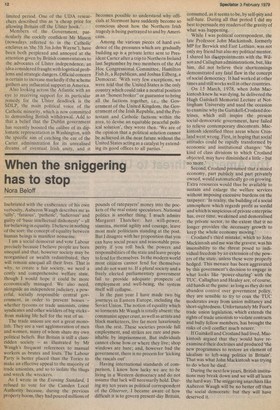When the sniggering has to stop
Nora Beloff
Inebriated with the exuberance of his own verbosity, Auberon Waugh describes me as 'silly', 'fatuous', 'pathetic', 'ludicrous' and guilty of 'basic intellectual dishonesty' — all for believing in equality. I believe in nothing of the sort: the concept of equality between human beings is manifest nonsense.
I am a social democrat and vote Labour precisely because I believe people are born unequal and that, however society may be reorganised or wealth redistributed, they will remain unequal all their lives. That is why, to create a fair society, we need a costly and comprehensive welfare state, though I would hope it could be more economically managed. We also need, alongside an independent judiciary, a powerful, socially responsible central government, in order to prevent bosses — whether tycoons or trade unionists, crime syndicates and other wielders of big sticks — from making life hell for the rest of us.
The trade unions are not a great monolith. They are a vast agglomeration of men and women, many of whom share my own political beliefs. But Britain is still a classridden society — as illustrated by Mr Waugh's frequent references to manual workers as brutes and louts. The Labour Party is better placed than the Tories to make an effective appeal to the majority of trade unionists, and so to isolate the thugs and wreck the wreckers.
As I wrote in the Evening Standard, I refused to vote for the Camden Local Authority because, during the previous property boom, they had poured millions of pounds of ratepayers' money into the pockets of the real estate speculators. National politics is another thing. I much admire Margaret Thatcher: her will-power, stamina, mental agility and courage, leave most male politicians standing at the post. But I disagree with her proposition that you can have social peace and reasonable prosperity if you roll back the powers and responsibilities of the state and leave people to fend for themselves. In the modern world most citizens cannot fend for themselves and do not want to. If a plural society and a freely elected parliamentary government fail to provide adequate prospects of employment and well-being, the system itself will collapse.
In the past year I have made two big journeys in Eastern Europe, including the Soviet Union. The notion of equality which so torments Mr Waugh is totally absent: the communist upper crust, as well as artists and black marketeers, live far more luxuriously than the rest. These societies provide full employment, and strikes are rare and punishable by imprisonment. But individuals cannot chose how or where they live; shop windows are bare; and, however bad the government, there is no process for 'kicking the rascals out'.
Having international standards of comparison, I know how lucky we are to be living in a Western democracy and do not assume that luck will necessarily hold. During my ten years as political correspondent of the Observer, I became aware of how difficult it is to govern present-day Britain, consumed, as it seems to be, by self-pity and self-hate. During all that period I did my best to persuade my readers of the gravity of what was happening.
While I was political correspondent, the late Professor John Mackintosh, formerly MP for Berwick and East Lothian, was not only my friend but also my political mentor. I shared his disappointments with the Wilson and Callaghan administrations, but, like him, did not believe their shortcomings demonstrated any fatal flaw in the concept of social democracy. It had worked at other times and still works well in other countries.
On 15 March, 1978, when John Mackintosh knew he was dying, he delivered the Hugh Gaitskell Memorial Lecture at Not tingham University and used the occasion to examine why the Gaitskell-Crosland doc trines, which still inspire the present social-democratic government, have failed to relieve contemporary discontents. Mac kintosh identified three areas where Cros land went wrong. First, in hoping that social attitudes could be rapidly transformed by economic and institutional changes: 'the kind of class divisions to which Crosland objected, may have diminished a little — but no more.'
Second, Crosland presumed that a mixed economy, part publicly and part privately owned, would automatically go on growing.
Extra resources would thus be available to sustain and enlarge the welfare services without imposing excessive burdens on the taxpayer: 'In reality, the building of a social atmosphere which regards profit as sordid and which is suspicious of private enterprise has, over time, weakened and demoralised the private sector, to the extent that it no longer provides the necessary growth to keep the whole economy moving.'
Crosland's third mistake, which to John Mackintosh and me was the gravest, was his insensibility to the threat posed to indi vidual freedom by an extension of the powers of the state, unless these were properly hedged. This menace has been aggravated by this government's decision to engage in what looks like 'power-sharing' with the TUC. Callaghan and Healey are, of course, old hands at the game: as long as they do not abandon control over government policy, they are sensible to try to coax the TUC moderates away from union militancy and short-sightedness. Unfortunately Mr Foot's trade union legislation, which extends the rights of trade unionists to violate contracts and bully fellow members, has brought the risks of civil conflict much nearer.
If Gaitskell and Crosland had lived, Mackintosh argued that they would have re examined their doctrines and produced 'the new programmes to restore an element of idealism to left-wing politics in Britain'. That was what John Mackintosh was trying to do when he died.
During the next few years, British institutions may break down and we will all learn the hard way. The sniggering anarchists like Auberon Waugh will be no better off than the social democrats: but they will have deserved it.


































 Previous page
Previous page